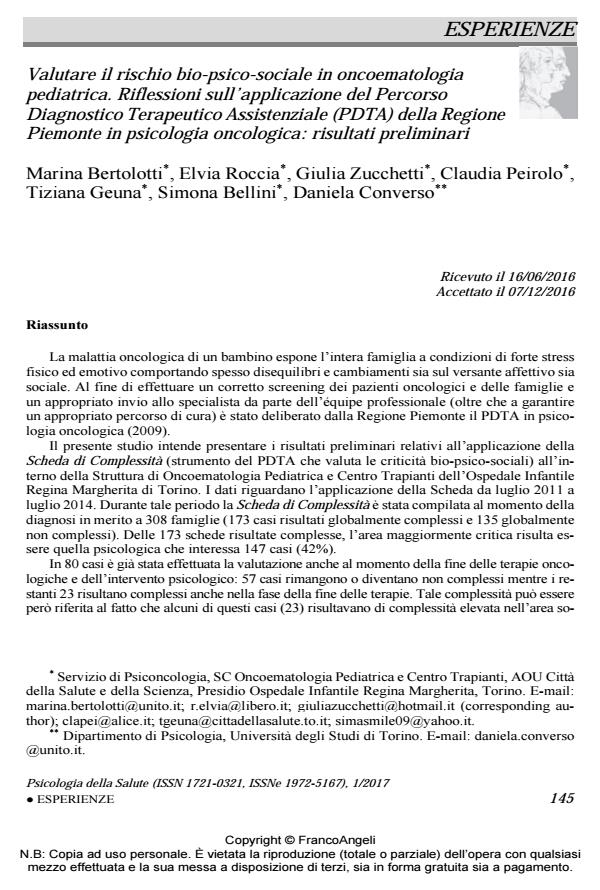Valutare il rischio bio-psico-sociale in oncoematologia pediatrica. Riflessioni sull’applicazione del Percorso Diagnostico Terapeutico Assistenziale (PDTA) della Regione Piemonte in psicologia oncologica: risultati preliminari
Titolo Rivista PSICOLOGIA DELLA SALUTE
Autori/Curatori Marina Bertolotti, Elvia Roccia, Giulia Zucchetti, Claudia Peirolo, Tiziana Geuna, Simona Bellini, Daniela Converso
Anno di pubblicazione 2017 Fascicolo 2017/1
Lingua Italiano Numero pagine 14 P. 145-158 Dimensione file 245 KB
DOI 10.3280/PDS2017-001008
Il DOI è il codice a barre della proprietà intellettuale: per saperne di più
clicca qui
Qui sotto puoi vedere in anteprima la prima pagina di questo articolo.
Se questo articolo ti interessa, lo puoi acquistare (e scaricare in formato pdf) seguendo le facili indicazioni per acquistare il download credit. Acquista Download Credits per scaricare questo Articolo in formato PDF

FrancoAngeli è membro della Publishers International Linking Association, Inc (PILA), associazione indipendente e non profit per facilitare (attraverso i servizi tecnologici implementati da CrossRef.org) l’accesso degli studiosi ai contenuti digitali nelle pubblicazioni professionali e scientifiche.
La malattia oncologica di un bambino espone l’intera famiglia a condizioni di forte stress fisico ed emotivo comportando spesso disequilibri e cambiamenti sia sul versante affettivo sia sociale. Al fine di effettuare un corretto screening dei pazienti oncologici e delle famiglie e un appropriato invio allo specialista da parte dell’équipe professionale (oltre che a garantire un appropriato percorso di cura) è stato deliberato dalla Regione Piemonte il PDTA in psicologia oncologica (2009). Il presente studio intende presentare i risultati preliminari relativi all’applicazione della Scheda di Complessità (strumento del PDTA che valuta le criticità bio-psico-sociali) all’interno della Struttura di Oncoematologia Pediatrica e Centro Trapianti dell’Ospedale Infantile Regina Margherita di Torino. I dati riguardano l’applicazione della Scheda da luglio 2011 a luglio 2014. Durante tale periodo la Scheda di Complessità è stata compilata al momento della diagnosi in merito a 308 famiglie (173 casi risultati globalmente complessi e 135 globalmente non complessi). Delle 173 schede risultate complesse, l’area maggiormente critica risulta essere quella psicologica che interessa 147 casi (42%). In 80 casi è già stata effettuata la valutazione anche al momento della fine delle terapie oncologiche e dell’intervento psicologico: 57 casi rimangono o diventano non complessi mentre i restanti 23 risultano complessi anche nella fase della fine delle terapie. Tale complessità può essere però riferita al fatto che alcuni di questi casi (23) risultavano di complessità elevata nell’area sociale mentre altri (7) presentavano una complessità psicologica/psichiatrica precedente alla diagnosi. La Scheda risulta dunque uno strumento utile per valutare eventuali rischi nelle famiglie, scegliere l’intervento e il livello più appropriato da adottare e valutarne l’outcome.
Parole chiave:Pazienti oncologici, psiconcologia, famiglia, PDTA
- Effects of a high-intensity psychosocial intervention among child–parent units in pediatric oncology Giulia Zucchetti, Giorgia Ambrogio, Marina Bertolotti, Luigi Besenzon, Fabio Borghino, Filippo Candela, Chiara Galletto, Franca Fagioli, in Tumori Journal /2020 pp.362
DOI: 10.1177/0300891620926226 - Il trattamento psicoterapeutico nella Sindrome Fibromialgica: le applicazioni della terapia dinamica breve in un setting ospedaliero italiano Annunziata Romeo, Valentina Tesio, Benedetta Vicino, Fabrizio Colonna, Enrico Fusaro, Daniela Converso, Lorys Castelli, in PSICOLOGIA DELLA SALUTE 1/2019 pp.119
DOI: 10.3280/PDS2019-001007 - Psychological Impact of COVID-19 on Parents of Pediatric Cancer Patients Antonella Guido, Elisa Marconi, Laura Peruzzi, Nicola Dinapoli, Gianpiero Tamburrini, Giorgio Attinà, Mario Balducci, Vincenzo Valentini, Antonio Ruggiero, Daniela Pia Rosaria Chieffo, in Frontiers in Psychology 730341/2021
DOI: 10.3389/fpsyg.2021.730341
Marina Bertolotti, Elvia Roccia, Giulia Zucchetti, Claudia Peirolo, Tiziana Geuna, Simona Bellini, Daniela Converso, Valutare il rischio bio-psico-sociale in oncoematologia pediatrica. Riflessioni sull’applicazione del Percorso Diagnostico Terapeutico Assistenziale (PDTA) della Regione Piemonte in psicologia oncologica: risultati preliminari in "PSICOLOGIA DELLA SALUTE" 1/2017, pp 145-158, DOI: 10.3280/PDS2017-001008